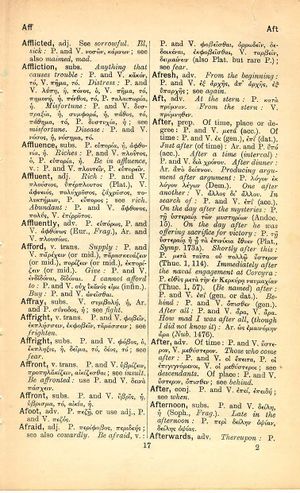after: Difference between revisions
m (Text replacement - "<b class="b2">Nub.</b>" to "''Nub.''") |
m (Woodhouse1 replacement) |
||
| Line 1: | Line 1: | ||
{{Woodhouse1 | {{Woodhouse1 | ||
|Text=[[File:woodhouse_17.jpg|thumb|link={{filepath:woodhouse_17.jpg}}]] | |Text=[[File:woodhouse_17.jpg|thumb|link={{filepath:woodhouse_17.jpg}}]] | ||
===preposition=== | |||
of [[time]], [[place]] or | |||
[[degree]]: [[prose|P.]] and [[verse|V.]] [[μετά]] (acc.). | |||
of [[time]]: [[prose|P.]] and [[verse|V.]] ἐκ (gen.), [[ἐπί]] (dat.). | |||
[[just after]] (of [[time]]): [[Aristophanes|Ar.]] and [[prose|P.]] [[ὑπό]] (acc.). | |||
[[after a time]] ([[interval]]): [[prose|P.]] and [[verse|V.]] [[διὰ χρόνου]]. | |||
[[after dinner]]: [[Aristophanes|Ar.]] [[ἀπὸ δείπνου]]. | |||
[[producing argument after argument]]: [[prose|P.]] [[λόγον ἐκ λόγου λέγων]] ([[Demosthenes|Dem.]]). | |||
[[one after another]]: [[verse|V.]] [[ἄλλος δι' ἄλλου]]. | |||
[[in search of]]: [[prose|P.]] and [[verse|V.]] [[ἐπί]] (acc.). | |||
[[on the day after the mysteries]]: [[prose|P.]] [[τῇ ὑστεραίᾳ τῶν μυστηρίων]] (Andoc. 15). | |||
[[on the day after he was offering sacrifice for victory]]: [[prose|P.]] [[τῇ ὑστεραίᾳ ἢ ᾗ τὰ ἐπινίκια ἔθυεν]] ([[Plato]], ''[[Symposium]]'' 173A). | |||
[[shortly after this]]: [[prose|P.]] [[μετὰ ταῦτα οὐ πολλῷ ὕστερον]] ([[Thucydides|Thuc.]] 1, 114). | |||
[[immediately after the naval engagement at Corcyra]]: [[prose|P.]] [[εὐθὺς μετὰ τὴν ἐν Κερκύρᾳ ναυμαχίαν]] ([[Thucydides|Thuc.]] 1, 57). | |||
( | ([[be named]]) [[after]]: [[prose|P.]] and [[verse|V.]] [[ἐπί]] (gen. or dat.). | ||
[[behind]]: [[prose|P.]] and [[verse|V.]] [[ὄπισθεν]] (gen.). | |||
[[after all]]: [[prose|P.]] and [[verse|V.]] [[ἄρα]], [[verse|V.]] [[ἆρα]]. | |||
[[how mad I was after all]], ([[though I did not know it]]): [[Aristophanes|Ar.]] [[ὡς ἐμαινόμην ἄρα]] (''[[Nubes]]'' 1476). | |||
===adverb=== | |||
of [[time]]: [[prose|P.]] and [[verse|V.]] [[ὕστερον]], [[verse|V.]] [[μεθύστερον]]. | |||
[[those who come after]]: [[prose|P.]] and [[verse|V.]] [[οἱ ἔπειτα]], [[prose|P.]] [[οἱ ἐπιγιγνόμενοι]], [[verse|V.]] [[οἱ μεθύστεροι]]; see [[descendants]]. | |||
of [[place]]: [[prose|P.]] and [[verse|V.]] [[ὕστερον]], [[ὄπισθεν]]; see [[behind]]. | |||
===conjunction=== | |||
P. and V. [[ἐπεί]], [[ἐπειδή]]; see [[when]]. | [[prose|P.]] and [[verse|V.]] [[ἐπεί]], [[ἐπειδή]]; see [[when]]. | ||
}} | }} | ||
Revision as of 08:49, 20 May 2020
English > Greek (Woodhouse)
preposition
degree: P. and V. μετά (acc.).
of time: P. and V. ἐκ (gen.), ἐπί (dat.).
just after (of time): Ar. and P. ὑπό (acc.).
after a time (interval): P. and V. διὰ χρόνου.
after dinner: Ar. ἀπὸ δείπνου.
producing argument after argument: P. λόγον ἐκ λόγου λέγων (Dem.).
one after another: V. ἄλλος δι' ἄλλου.
in search of: P. and V. ἐπί (acc.).
on the day after the mysteries: P. τῇ ὑστεραίᾳ τῶν μυστηρίων (Andoc. 15).
on the day after he was offering sacrifice for victory: P. τῇ ὑστεραίᾳ ἢ ᾗ τὰ ἐπινίκια ἔθυεν (Plato, Symposium 173A).
shortly after this: P. μετὰ ταῦτα οὐ πολλῷ ὕστερον (Thuc. 1, 114).
immediately after the naval engagement at Corcyra: P. εὐθὺς μετὰ τὴν ἐν Κερκύρᾳ ναυμαχίαν (Thuc. 1, 57).
(be named) after: P. and V. ἐπί (gen. or dat.).
behind: P. and V. ὄπισθεν (gen.).
after all: P. and V. ἄρα, V. ἆρα.
how mad I was after all, (though I did not know it): Ar. ὡς ἐμαινόμην ἄρα (Nubes 1476).
adverb
of time: P. and V. ὕστερον, V. μεθύστερον.
those who come after: P. and V. οἱ ἔπειτα, P. οἱ ἐπιγιγνόμενοι, V. οἱ μεθύστεροι; see descendants.
of place: P. and V. ὕστερον, ὄπισθεν; see behind.

